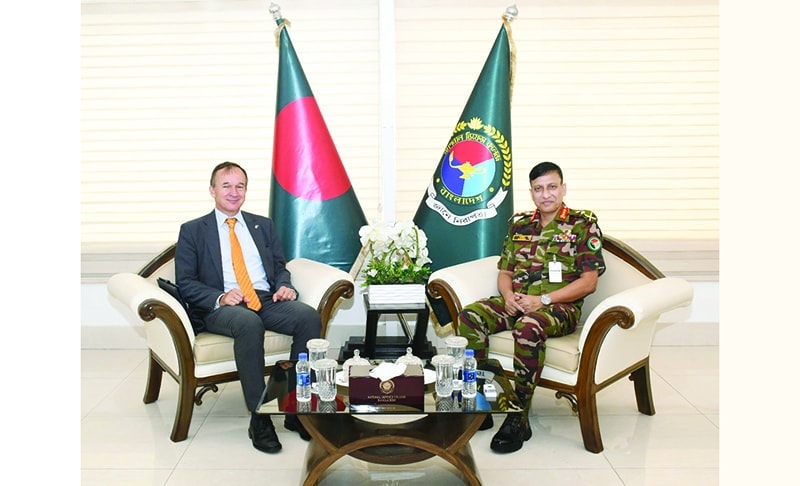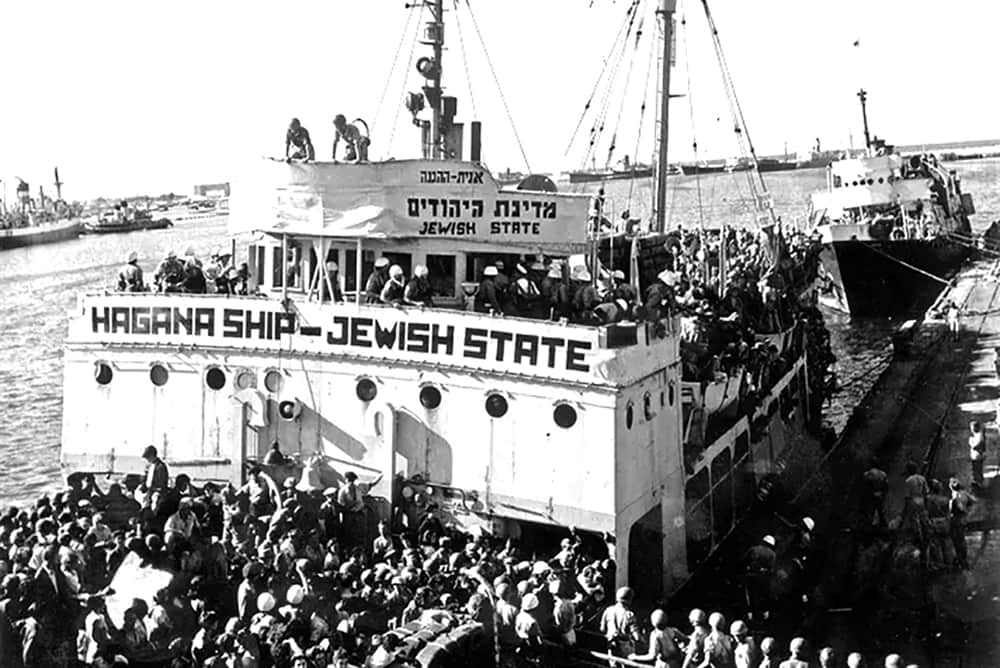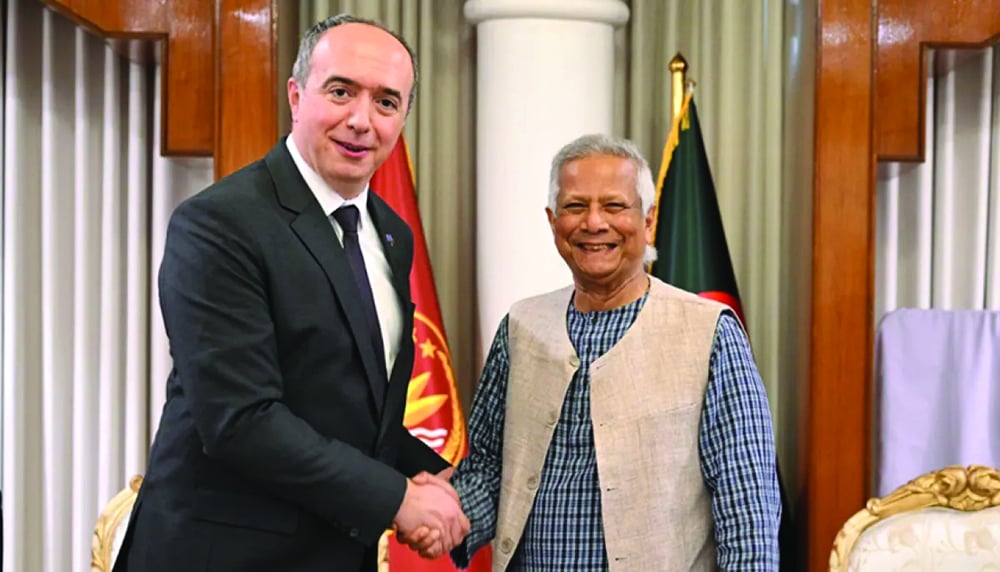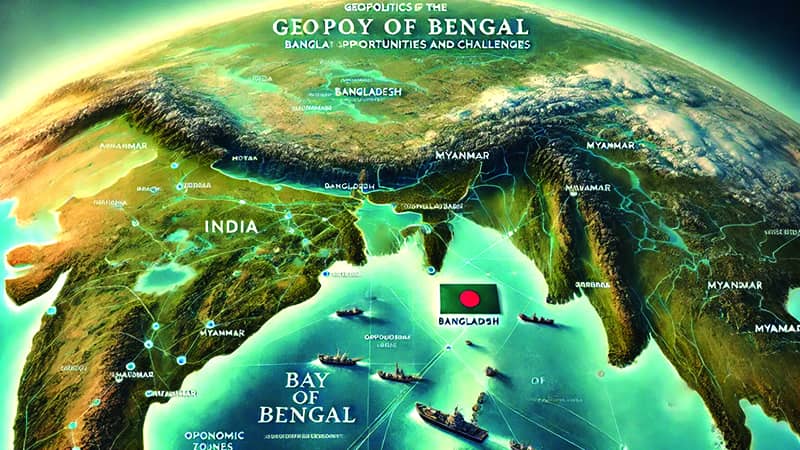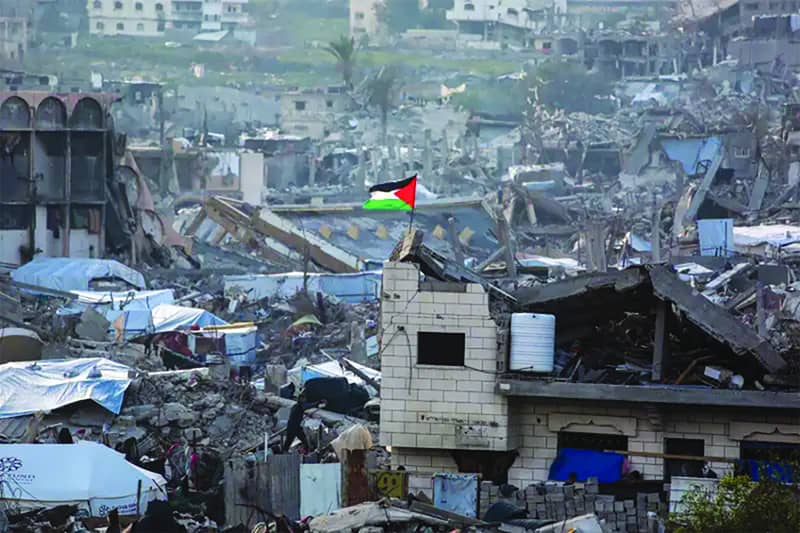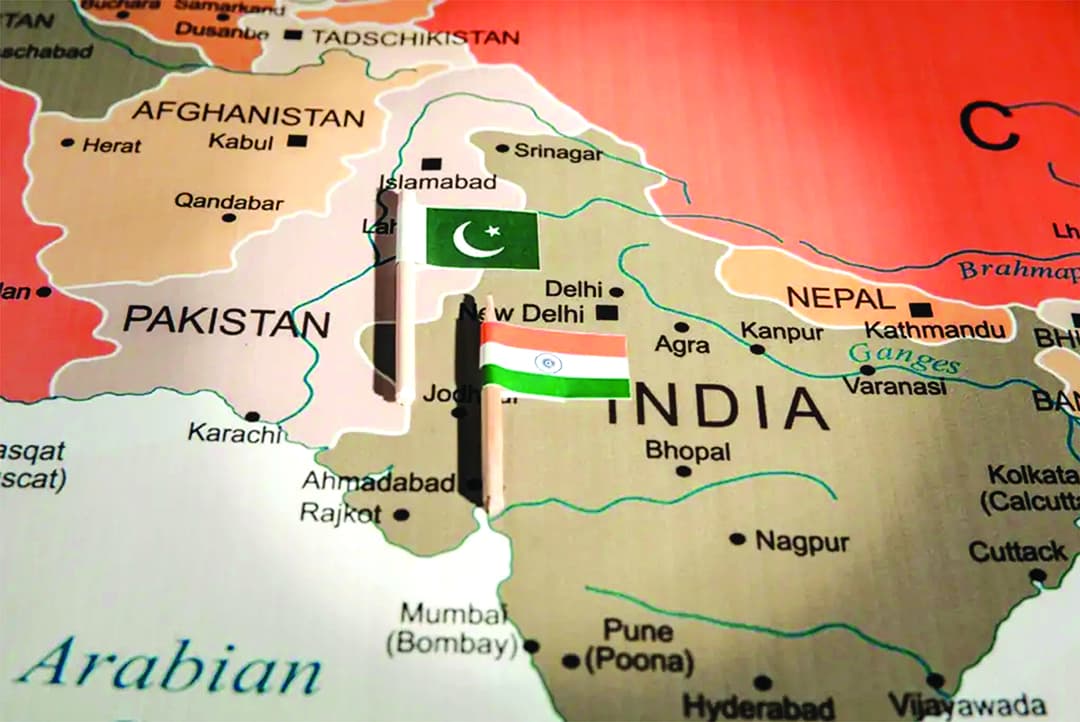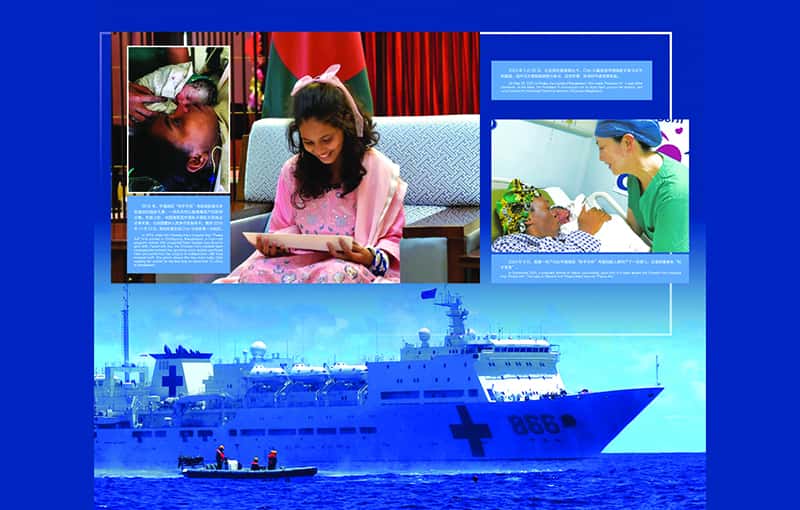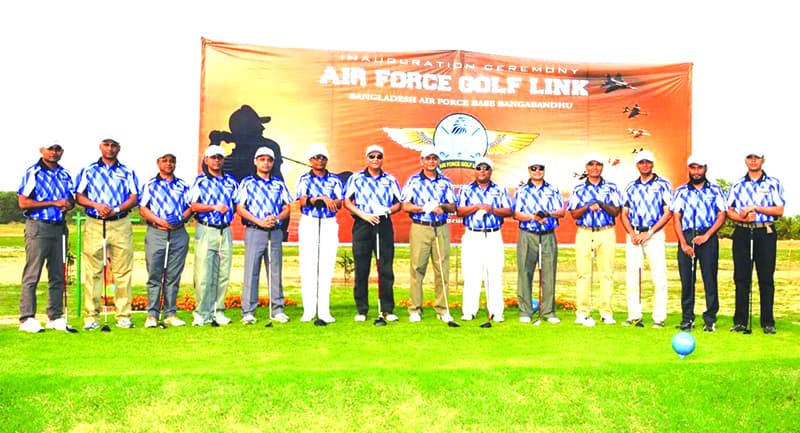MEMOIR
TRENCH WARFARE
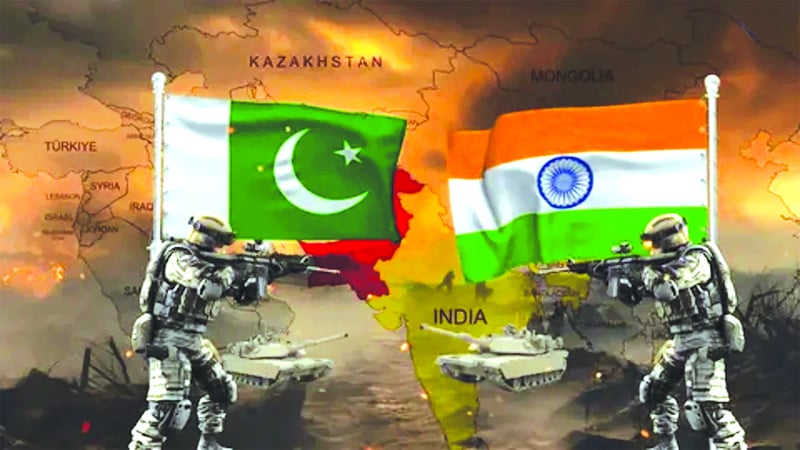
Air Vice Marshal Mahmud Hussain (Retd)
He was High Commissioner of Bangladesh to Brunei Darussalam. He served as the Chairman, Civil Aviation Authority of Bangladesh (CAAB). Presently, he is working as the Distinguished Expert at the Aviation and Aerospace University (AAUB)
Pakistan and India had fought two wars over Kashmir. So, uncle Ashraf was very confident that Karachi would not be attacked from the air by the Indian Air Force.
“Don’t worry Aolad Saheb! You have no fear from the Indians,” he said in a perfect accent of Urdu. “Karachi is redoubtable. India can’t take East Pakistan. Our army has kept the Indians tied down in the eastern front. So, all is quiet in the western front.” Uncle Ashraf was our neighbor. In spite of being a doctor in the army, he took immense interest in the military history. He had a big library in his house which contained in the least three thousand books most of which were about great military operations and military leaders. His love of military studies far outstripped his knack for reading medical journals a habit that ill-suited his professional ethics. Nothing could be more boring to a patient when from a doctor, instead of learning about the prophylactics that could seduce his malaise, he is told stories of soldiers’ unflinching loyalty to bearing pain of wounds in the face of death.
One can forbear the insouciance of a general but to allow the same degree of latitude to a medic is tantamount to being a rogue. So, uncle Ashraf also carried with him the opprobrium of a snoot. Despite all the rumpus of infamy, he was in the service because doctors were a rarity in the army. Market demand ran much higher than the local supply of service providers. However, in the aggregate, I found uncle Ashraf a good person at heart; he admired my class results and often soulfully appreciated my taste for poetry at so early an age, something which his son Aslam, my classmate, could never beget. “You Bengalis are very musical,” was a recognition that I cherished with ineluctable delight.
He often cited to my father, “Aolad Saheb, doctors have also received the Victoria Cross for their action in the battlefield. Have you heard the names of Noel Chavasse and Arthur Martin-Leake? No, I don’t think so? They both received the Victoria Cross for their bravery. They were both doctors.” My father interrupted, “The next to receive the highest military decoration on behalf of the doctors will be you, Ashraf Bhai,” without realizing that he had unintentionally hurt his friend’s perch of chivalry. Unperturbed Uncle Ashraf redoubled his reply, “You Bengali guys have no inkling of military history. Remember there is no history without wars……. This war will be over in just about a few days, and all will be perfect as it happened after the ’65 war.” With a little gasp, he aired out a sigh of pity exhuming, as though he was an astrologer of great merit in the line of Shri Rajneesh Bhagwati, “We might even see the death of the great Indian leader as we witnessed the death of Lal Bahadur Shastri after the Tashkent Mela”. His wit and humour used to be unexpectedly surprising.
My father being the soberer and more sensible, avoided arguing with him in intellectual ruffles for fear of blowing out his ignorance in matters of profound knowledge. Moreover, father always wanted to keep good relations with the neighborhood where our home was the only one that belonged to a Bengali family in the company of those of the west Pakistanis.
North
American F-86 Sabre of No 19 Squadron PAF. Photo: Net
There was one more reason for which father detested altercation with uncle Ashraf and other non-Bengali colleagues. Father had a good hand at cards, particularly in playing Contract Bridge. Uncle Ashraf was his bosom partner and it was every Saturday evening, they would part company with their wives in a mood of defiant personality and spent the night, Sunday morning, afternoon, and evening under the roof of Fleet Club playing cards to the utmost forgetfulness of the whole world. In that respect, they were the twin noblemen of Mirza and Mir Ali of Avadh, the two chess players of Shatranj Ke Khilari, under whose nose the British annexed their homes without their being a wee bit sorrowful of having undone a historical drama. Munshi Premchand had not seen Ashraf Saheb and Aolad Saheb. Had he, he would have certainly written something, this time a long story, and would have named it Card Ke Jhigri Bandey —— the valentine devotees of Cards.
But fate did not remain faithful to uncle Ashraf’s words. Early December 1971, Pakistan committed the blunder of declaring war against India, and attacked India in the western front to the dismay of uncle Ashraf. He was infuriated and blurted to my father, “These Pakistani politicians are the worst creatures,” as though declaring wars was the business of the masters, and the army was the mere servant to carry out the orders. Uncle Ashraf forgot that the political baton of the country at that time was in the hands of a general named Yahya Khan. Yahya was more in circulation value for his whisky and ribald escapades. It would, perhaps, be difficult for the historians to trace the marks of credentials in his military career. But there was something else in the mind of uncle Ashraf burning as the cause of his self-immolation. 3 December was a Friday, and the next day for card playing was shattered in the onslaught of a national disaster. The news of war also brought upon us the holy task of survival.
“Aolad Saheb, we have to build our trenches. Tomorrow, the Base Adjutant will send few laskars to help us out. Do you have pick-axe, shovels, spades, mattocks, hoes, trowels,” uncle Ashraf rattled the names in a single breath as though he was the digger to be provided with the tools by the gardener in the person of my father. We had quite a sizeable lawn in front of our house, and father tended the grass with care and love of a debonair horticulturist. I enjoyed the sight of his pushing the lawn mower in perfect straight lines and behind him, I trudged upon the nimble soft earth in naked feet sloshing the grass and from time to time halted to scratch the right toe against the left ankle to benumb the itching.
“I have just one set for my house,” my father replied, “let’s go to the market to buy the items for you. If you can’t get the trenches by tomorrow, it will be risky to open ourselves up to Indian fighters from the sky ………” Uncle Ashraf interrupted, “What a bullshit! Do you think our fighter pilots will be snoring in their flying pans? Once I was deputed to the air force, and I have seen these hotshot pilots. They won’t let the Indian birds get into our sky. It is a pity that air force has de-seated the Bengalis……. I don’t know why they should mistrust the Bengalis at this moment of great crisis.”
Uncle Ashraf, contrary to usual Pakistani cliché, admired the grit and pluck of the Bengalis. “Squadron Leader M M Alam was from East Pakistan, and shot down eleven Indian planes. A great ace…. Flight Lieutenant Saiful Azam shot down four Israeli aircraft, another hero of Pakistan who was decorated in Iraq and Jordan for his aerial chivalry. You know he was the personal friend of King Hussein. You don’t know ….. ”, giving a mild reprimand to my father for his lack of knowledge about his own people.
However, my father knew all these stories but did not oppose him because in truth, it ennobled his pride in Bengali greatness. I as a child listened with amazement when Uncle Ashraf spoke of the contribution of Bengali Muslim politicians being in the lead to the birth of Pakistan. It did give me a sense of superior feeling, something which the history textbooks taught in the schools very artfully avoided in their narrative.
By the time the tools were brought, it was late in the evening. But the digging had to start. Uncle Ashraf wanted to start the work the next morning, but my father was insistent. He had this uncanny feeling that delaying the work will only mean negotiating with the risk because war in the western front had already started.
There were four houses in a row. Bungalow would be a better term for their identification. These beautiful homes were built during British period, that is what the story was circulated about. Two of them were single-storied and the other two double-storied. Each of them was flanked in front with a lawn and behind a vegetable garden. All front lawns were symmetrical, lined on their front edge was the hedge fencing. The hedge served more as a beauty to sight rather than a physical barrier. The spaciousness of the bungalows was enormous, their breadth occupied the size of a football field.
In front of the bungalows sat an enormously out-sized field where on Sundays, four cricket matches were played by the local boys. Away from the field on one side, enclosed by boundary walls on all sides, was the Pakistan Navy, in short PN, colony for the sailors’ married quarters. All Bengali married sailors lived there with their families and there were quite a few of them. With the help of young Bengali kids, a senior Bengali boy formed a cricket team and we named it ‘Bengali Star Cricket Club’ in short BSCC. Being the youngest of the team, I was always treated with care and attention by my seniors. But my sortie was limited to practice sessions only; I was never included in the fixed matches. So, when the real matches came up, my job was to defend my team as an umpire only. Uncle Ashraf was never happy with such an arrangement. But my captain thought better of it, confiding in my father that any short bouncer from a Punjabi rogue might cost me my jaw at so early an age. Father was always happy to hear that taking in the logic of survival of the body first rather than displaying foolhardy daring.
The next day, all the elderly residents of the houses started debating on the selection of the sites for digging. Uncle Ashraf was of the opinion to dig the trenches inside one’s own compound so that they were not visible from outside. But two of the four including father opposed the idea. I am sure father had in mind not to destroy the beauty of our garden. Our garden stood out as a symbol of loveliness and art. If any harm to scenic beauty was caused, better it was condemned to outside of the perimeter walls of the bungalows despite there being a risk of exposing oneself under the open sky. Finally, my father prevailed. I was happy that our winter flowers would not be sacrificed. Sometimes, our love of aesthetics far surpasses our love of the mundane.
Laskars came from the office. There was a lot of enthusiasm. The officers joined hands with the menial workers. The women brought snacks and tea. Wars do not only distance people, they unite them also. Trenches were dug enough deep to hide the tallest man in the family in standing position.
Then ensued another debate whether to have the sandbags to enfold the trenches from all sides. Uncle Ashraf said that sandbags would stand out clearly from the air, and offer a clear sight of target to the pilots. He then explained in detail the route that the enemy pilots would follow on their return after completing the mission over Karachi port where the targets were the naval ships and oil refineries.
“So, we shall have wooden planks on top of the trenches. At one corner, there will be an opening for people to get down the trenches,” uncle Ashraf opined. My father retorted, “Pilots will never hit our homes. For them it is pointless. By then they will have finished their ammunition. Let us put up the sandbags as instructed by the base authority. Wooden planks will completely seal the inside of the trenches turning them into graves. Some might even collapse out of fear of claustrophobia. Utter darkness leads to asphyxiation, particularly of women and children. It will be like dying of nothing without a bullet being struck.”
Others joined in the debate. Some supported uncle Ashraf, while others took the side of my father. But my father’s arguments were more logical. They were based on medical conjectures and witty stipulation. So, my father lodged his second victory over uncle Ashraf in the science of trench warfare.
For the first few nights, Karachi was silent. A few days later, first air raid siren was blown. We all ran to our respective shelters.
“Ashraf bhai, are you there?” my father shouted in a muffled voice from inside his trench. There was no reply. “Is he there?” father imagined. Just after that there was a big sound of the fighter jets crossing over us to return back to their base in India. Father was not sure if the sound of the jets belonged to Indian attackers or Pakistani pursuits. But I still remember the women were scared to death by the heavy sound hearing it for the first time in their life. They started chanting verses from surahs for protection of God.
I wondered how accurate uncle Ashraf was in imagining the secret aerial route that pilots take on their escape exit from a perilous mission into an enemy territory. Strange, once the air raid siren was blown the second time to announce the end of the enemy raid, there was a pin-drop silence for few minutes before people came out of their trenches. Unlike ground raid from which fear lingers uninterrupted even after the raid is completed, air raids are discrete and fear from which dissipates the moment the raid is withdrawn. Everyone heaved a sigh of relief!
“Aolad saheb, you were right they will not attack us, but traumatize us! Your Bhabijan was almost driven to death. She was angry with me as though I waged the war with East Pakistani Bengalis”. I understood then despite being a small boy that human rationality in times of acute phobia follows the principles of cognitive perceptiveness. It is subjective but its forcefulness cannot be denied. Uncle Ashraf being a doctor might have studied military history with pleasure but his wife’s conviction came from an ordinary person’s passion for sanity.
The next day, uncle Ashraf came with a renewed proposal.
“Aolad Saheb, we need to shift our site of trenches from the front to the back of our house. The front is open and your sandbags are visible in clear moonlight.” Father was little annoyed for it entailed another day’s of hard work. It made no sense at all why uncle Ashraf was so firm in his mood. “See, Aolad saheb, our backyards are shielded by our homes, and the tall trees around the boundary walls camouflage everything underneath. Our safety will be guaranteed hundred percent. On their way back, the Indians may drop one or two stray bombs that might hit us. But the backyards of these houses remain invincible.”
I was surprised to see the gradual transformation in uncle Ashraf’s psychic dilemma from the invincibility to Pakistan to the invincibility of air force pilots to the invincibility of homesteads. Finally, father relented but it also meant for him haggling with the base officials for sparing the Laskars for another day. Releasing them for personal needs the second time in war naturally invited a reprimand from the seniors which father always detested being a Bengali.
So, the next day again the digging started but this time the number of laskars were few; the entire work had to be done by family members. When we had finished at the late evening, uncle Ashraf came to our house to see the condition of our trench. He also got the sandbags removed from his front trench and helped us remove from our own. We did not fill up the hole which he thought could wait one or two days to give us respite from our that day’s long labour.
As he was leaving us, he said softly, “Inshallah, the last victory will be ours.” He said this in Urdu. Most of the time he talked with father in English with a strong Punjabi accent. Father kept silent. I assumed he expected an answer but was disappointed.
Once he was gone, father repeated the words to me, “Inshallah, the last victory will be ours.” I understood what father meant. We used to listen to Akash Bani Calcutta at night in low volume. The war was drawing to a close. The victory was near with Indian army advancing with the support of Mukti Bahini in full command of the theater, and were approaching the capital Dhaka.
The next few days, there were air raids over Karachi but these were limited to the Karachi harbour. We heard the whizzing past of the attacking fighters but none seemed threatening to our houses. We went inside the trenches, and once the siren was blown announcing the departure of the attack, we came out of the holes. But auntie Ashraf told my mother that uncle Ashraf made it obligatory for his family to remain locked into the hell-hole trench for another half an hour because he had lost faith in the radar detection capabilities of the Pakistan air defence system.
The war had not only made uncle Ashraf decrepit of logical reasoning, it had also emaciated his emotional equilibrium. There are times when humans learn to adapt truth to the unrealities around them rather than relying on the state version of truth. I think uncle Ashraf had reached that point of sobriety toward the end of 1971 war.
On 16th December, Pakistan surrendered to the joint Indo-Bangladesh forces. And Bangladesh was born.
After that uncle Ashraf became little detached, and his visits to our home were infrequent and rare. Father also lost interest in playing cards at the fleet club, most of his evenings were spent at home. Our school which was only for the Bengali boys was closed down. The school was the last vestige of exclusive Bengali presence in Karachi. The city which was many of our birthplace seemed so distant, and was reluctant to take us in as its own.
Few months after, all the Bengali families were shifted to a concentration camp in a place called PNS Karsaz. On the day of departure, uncle Ashraf with his family came to say good-bye to us.
“Aolad saheb, I pray Pakistan takes action for your repatriation as quickly as possible. I wish you a safe journey to Bangladesh.” Uncle Ashraf was genuinely sad. Father was sad too. They made the best of partners in contract bridge. Their trench warfare ended in declaring all quiet in the western front because there was a new sun that had risen in the eastern front.
We packed our luggage and loaded the truck provided by the office. As the truck rolled forward, I looked back. I saw uncle Ashraf waving his hand till we were out of sight.
We never heard from him ever after.






